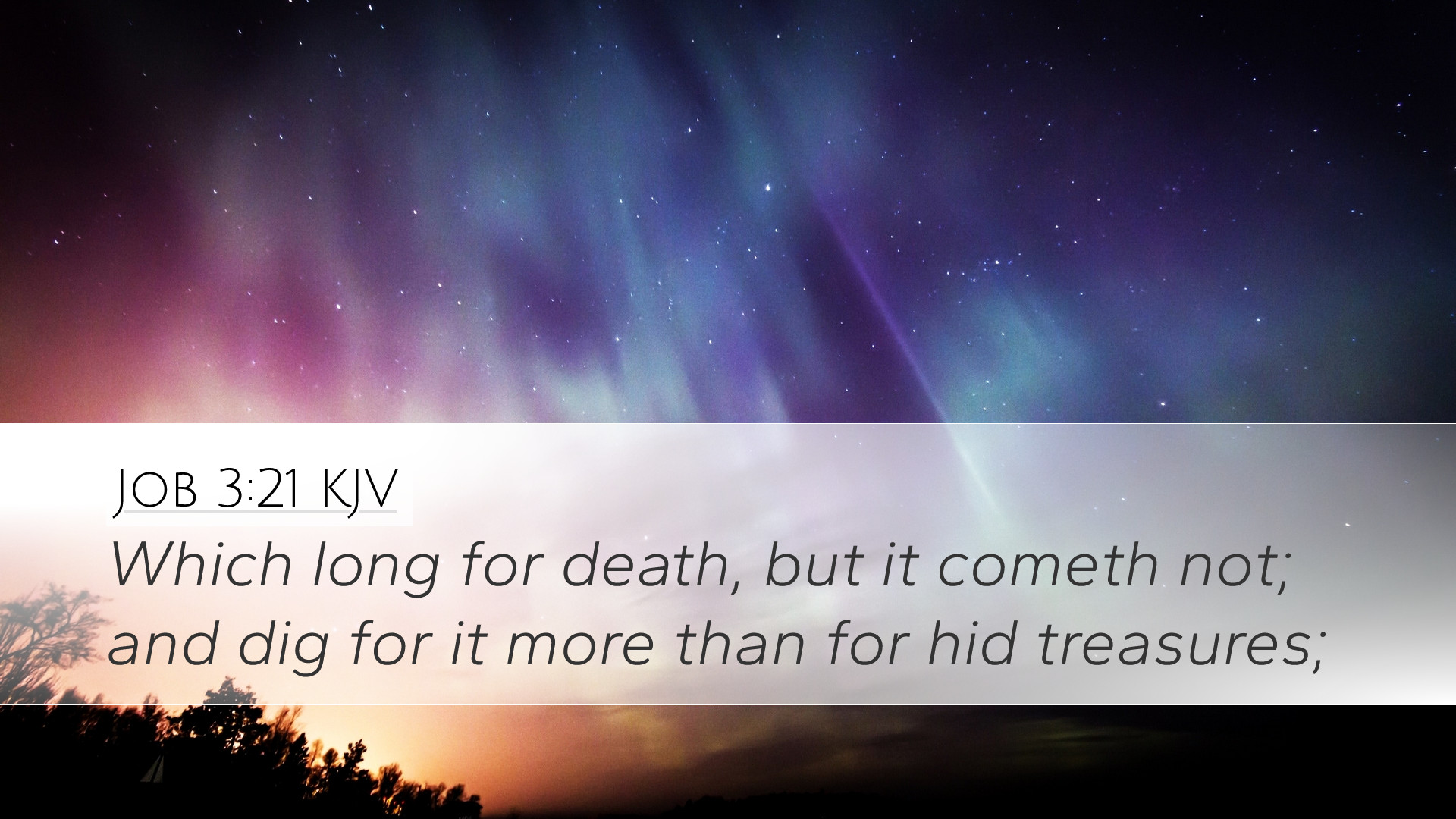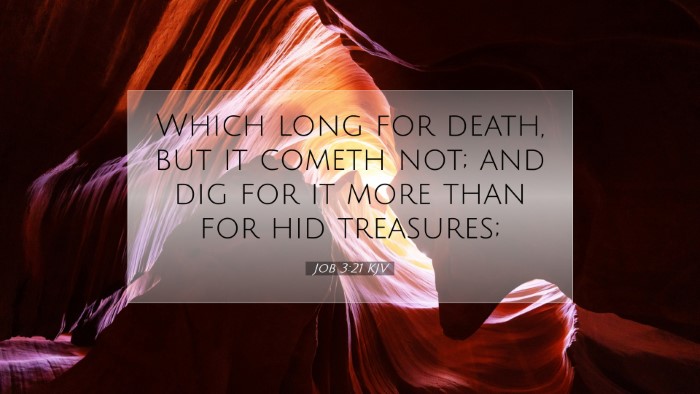Old Testament
Genesis Exodus Leviticus Numbers Deuteronomy Joshua Judges Ruth 1 Samuel 2 Samuel 1 Kings 2 Kings 1 Chronicles 2 Chronicles Ezra Nehemiah Esther Job Psalms Proverbs Ecclesiastes Song of Solomon Isaiah Jeremiah Lamentations Ezekiel Daniel Hosea Joel Amos Obadiah Jonah Micah Nahum Habakkuk Zephaniah Haggai Zechariah MalachiJob 3:21
Job 3:21 KJV
Which long for death, but it cometh not; and dig for it more than for hid treasures;
Job 3:21 Bible Commentary
Commentary on Job 3:21
Overview: Job 3:21 captures the profound anguish of Job as he laments the day of his birth. It reflects themes of despair, the desire for death, and the human struggle with suffering.
Text of Job 3:21
Job 3:21: “Which long for death, but it cometh not; and dig for it more than for hid treasures.”
Commentary Insights
1. The Context of Job's Lament
In this chapter, Job finds himself in an exceedingly dark moment. After suffering tremendous loss and pain, he curses the day of his birth (Job 3:1). The emotional state of Job demonstrates a struggle with existential questions, encapsulated within the cry of despair expressed in verse 21. Here, he articulates a deep longing for death as a relief from his suffering.
2. Longing for Death
Albert Barnes notes that Job's desire for death stems from his overwhelming bitterness and pain. Job feels that death would be a welcomed end to his suffering, revealing a profound human emotion faced by many – the yearning for relief in times of anguish. Job does not simply seek death but longs for an escape from his present reality, which he views as unbearable.
3. The Imagery of Treasure
In comparing his desire for death to the pursuit of "hid treasures," Job's words reflect a deep desperation. According to Matthew Henry, this imagery indicates that Job values the concept of death more than life’s earthly riches. This metaphor highlights how unbearable his suffering has become; death is imagined as something precious and elusive that he seeks fervently in the midst of turmoil.
4. The Search for Meaning
Adam Clarke emphasizes that Job’s lament reveals the human condition’s complex relationship with suffering. The search for meaning amid pain is a common theme throughout Scripture. In Job's case, his yearning for death illustrates a deep existential crisis, leading readers to ponder the nature of life, death, and divine providence.
5. Theological Reflections
The verse invites reflection on the theology of suffering. It forces pastors and theologians to grapple with the reasons behind human suffering and the question of God's presence in times of distress. Job’s doubts and unfiltered expressions echo through generations, challenging scholars to explore the purpose of pain and the mystery of God’s ways.
6. Human Despair in Light of Hope
While Job’s lament seems overwhelmingly bleak, scholars emphasize the importance of holding this despair within the broader narrative. As indicated by Matthew Henry, the final resolution of Job’s story is one of restoration and hope. This contrast allows for a deeper understanding of biblical suffering as not devoid of hope, but as a passage through which God can reveal Himself even in the darkest of moments.
7. Application for Today’s Believers
Job 3:21 serves as a poignant reminder for contemporary believers regarding the realities of suffering. Barnes and Clarke suggest reflecting on how such cries for relief can lead to deeper spiritual insights and provoke questions about one’s relationship with God. Pastors can use this text to minister to those in pain, showing that their feelings are acknowledged and that the search for relief is a part of the human experience.
8. Conclusion
In light of the insights from these public domain commentaries, Job 3:21 becomes more than a lament; it is a reflective space where anguish meets the divine. It portrays the raw human experience of suffering, the quest for meaning, and the ultimate hope found in God's plan. For theologians, it opens avenues for deeper study into the mystery of divine providence, and for students, it offers profound lessons on the nature of hope amidst despair.


